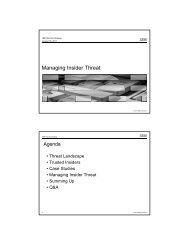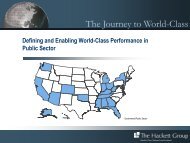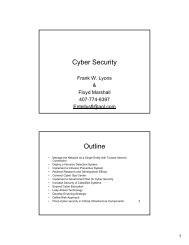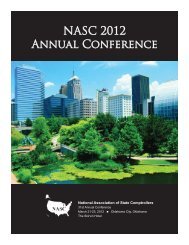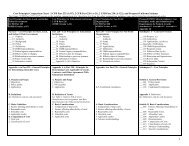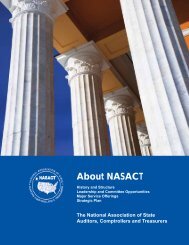Advisory Committee on Tax Exempt and Government Entities (ACT ...
Advisory Committee on Tax Exempt and Government Entities (ACT ...
Advisory Committee on Tax Exempt and Government Entities (ACT ...
You also want an ePaper? Increase the reach of your titles
YUMPU automatically turns print PDFs into web optimized ePapers that Google loves.
The Appropriate Role Of The Internal Revenue Service With Respect To <strong>Tax</strong>-<strong>Exempt</strong> Organizati<strong>on</strong> Good Governance Issues(1) The IRS Should C<strong>on</strong>tinue to Work Collaboratively With The <strong>Tax</strong>-<strong>Exempt</strong>Community In C<strong>on</strong>necti<strong>on</strong> With Its Governance Initiatives. The IRS’sapproach to the redesigned Form 990 for 2008 has been a model ofinclusiveness <strong>and</strong> collaborati<strong>on</strong>. After releasing a draft redesigned Form 990 forpublic comment in June of 2007, the IRS reached out broadly to the n<strong>on</strong>profitcommunity <strong>and</strong> the public to discuss the draft <strong>and</strong> solicit input. The IRSultimately received over 650 comments, amounting to more than 3,000 pages,much of which was reflected in the revised redesigned Form 990 released inDecember of 2007. The result is a substantially better form, including withrespect to the governance questi<strong>on</strong>s c<strong>on</strong>tained therein. In April of 2008, the IRSc<strong>on</strong>tinued this exemplary process, releasing draft instructi<strong>on</strong>s, including a draftglossary, for public comment. The “Governance <strong>and</strong> Related Topics – 501(c)(3)Organizati<strong>on</strong>s” materials added to the Life Cycle are useful <strong>and</strong> a significantadvancement over the earlier draft. But we believe they could have been evenbetter if they had the benefit of more input. For example, we believe thedocument structure should, with respect to each subpart, relate therecommended practice to the tax rules <strong>and</strong> state with respect to each practicethat it is not required for exempti<strong>on</strong>; focus more <strong>on</strong> practices than policies; focus<strong>on</strong> charitable purposes <strong>and</strong> not “missi<strong>on</strong>;” include either more explanati<strong>on</strong> ordelete the recommendati<strong>on</strong> to keep fundraising costs “reas<strong>on</strong>able;” <strong>and</strong> includeeither more explanati<strong>on</strong> or delete the recommendati<strong>on</strong>s for an audit byindependent auditors overseen by an independent audit committee. We believethat the sample c<strong>on</strong>flict of interest policy in Appendix A to the instructi<strong>on</strong>s of theForm 1023, as well as the inquiries in the Form 1023 about whether a policy“c<strong>on</strong>sistent with the sample c<strong>on</strong>flict of interest policy” could be improved up<strong>on</strong>with input from the tax-exempt community. 141 If IRS agents are going to utilize apost-exam checklist to assist in determining the impact of governance, we wouldhope that the IRS would seek input from the n<strong>on</strong>profit community with respect toboth the checklist <strong>and</strong> the process employed. The desirability of bothcollaborati<strong>on</strong> 142 <strong>and</strong> an opportunity for comment in the governance arena isparticularly str<strong>on</strong>g because the IRS involvement in governance is discreti<strong>on</strong>ary,the subject is not mainstream to IRS expertise, there are a significant number ofsubstantive experts in the field, <strong>and</strong> there are numerous viewpoints reflectingboth the diversity of the sector <strong>and</strong> the dearth of empirical evidence.141The IRS does not explain in c<strong>on</strong>necti<strong>on</strong> with the Form 1023 what parts of the sample c<strong>on</strong>flict of interest policy it c<strong>on</strong>siders criticalor what “c<strong>on</strong>sistent with the sample c<strong>on</strong>flict of interest policy” means. For example, unless an organizati<strong>on</strong> simply adopted the IRSsample policy, it would be unusual for a c<strong>on</strong>flict of interest policy to call for “periodic reviews” of compensati<strong>on</strong> arrangements <strong>and</strong>benefits or partnerships, joint ventures, <strong>and</strong> arrangements with management organizati<strong>on</strong>s to “ensure that the Organizati<strong>on</strong>operates in a manner c<strong>on</strong>sistent with charitable purposes <strong>and</strong> does not engage in activities that could jeopardize its tax-exemptstatus,” <strong>and</strong> to authorize the use of “outside experts” (c<strong>on</strong>fusingly denominated as “outside advisors” in the immediately priorsentence). Moreover, if an organizati<strong>on</strong> follows the rebuttable presumpti<strong>on</strong> of reas<strong>on</strong>ableness under IRC secti<strong>on</strong> 4958 it is not clearwhy such a compensati<strong>on</strong> review is necessary; nor is it clear why routine management arrangements for food service, security,parking, or laundry necessarily merit such a review.142The <strong>Exempt</strong> Organizati<strong>on</strong>s Divisi<strong>on</strong> may want to discuss with the Officer of Inspector General of the Department of Health <strong>and</strong>Human Services its experiences in releasing three publicati<strong>on</strong>s <strong>on</strong> governance jointly with the American Health LawyersAssociati<strong>on</strong>. See Appendix 3.ADVISORY COMMITTEE ON TAX EXEMPT AND GOVERNMENT ENTITIES (<strong>ACT</strong>) June 11, 2008 47






